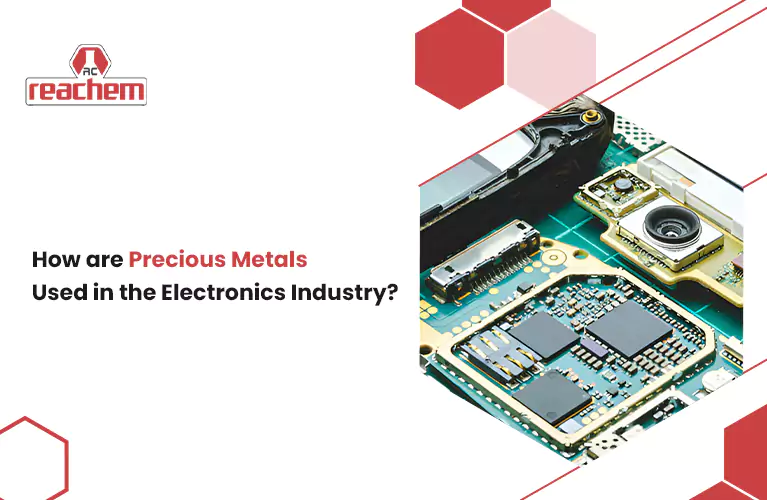wordpress-seo domain was triggered too early. This is usually an indicator for some code in the plugin or theme running too early. Translations should be loaded at the init action or later. Please see Debugging in WordPress for more information. (This message was added in version 6.7.0.) in /var/www/reachemchemicals.com/blog/wp-includes/functions.php on line 6131
Welcome to our exploration of how precious metals are utilised in the electronics industry! As technology advances rapidly, the demand for smaller, faster, and more efficient electronic devices is ever-increasing. Precious metals are known for their conductivity, durability, and resistance to corrosion. It plays a crucial role in achieving these technological advancements. This blog will explore how precious metals are used in the electronics industry, from circuitry to connectors. Get ready to uncover the fascinating world of precious metals and their indispensable contributions to our everyday electronic devices.
Precious metals are valued in the electronics industry for their exceptional conductivity. This allows for the efficient flow of electrical currents. Let’s explore how this property is utilised:
Gold is renowned for its high conductivity, making it ideal for electrical contacts and connectors. Its low resistance ensures minimal loss of electrical energy, resulting in more efficient performance of electronic devices.
Silver is another precious metal prized for its excellent conductivity. It is commonly used in circuitry and printed circuit boards (PCBs). This is due to its ability to facilitate the flow of electrical signals without significant resistance.
While not traditionally considered a precious metal, copper is widely used in the electronics industry for its conductivity. It is employed in wiring and interconnects within electronic devices, providing a cost-effective yet efficient solution for electrical conduction.
Platinum is less commonly used than gold or silver and exhibits high conductivity. It finds applications in specialised electronic components. These include medical implants and aerospace technology, which require unique properties.
Palladium possesses excellent conductivity and is often used as a substitute for gold or platinum in specific electronic applications. Its versatility extends to catalytic converters in automobiles, where it helps reduce emissions and improve fuel efficiency.
Rhodium is known for its hardness and resistance to corrosion. It is used as a coating material for electrical contacts and connectors. Its durability ensures reliable performance in demanding environments like automotive and aerospace systems.
The exceptional conductivity of precious metals ensures the seamless flow of electrical currents in electronic devices, contributing to their efficient performance.
In addition to their conductivity, precious metals offer durability and resistance to corrosion. This makes them suitable for long-term use in electronic applications. Here’s how these properties are advantageous:
Gold is highly corrosion-resistant, allowing it to maintain its conductivity over time. This property makes gold ideal for components exposed to environmental factors or harsh operating conditions.
Silver exhibits good resistance to corrosion, ensuring the longevity of electronic components in which it is used. Its durability makes it a preferred material for electronic device contacts, switches, and connectors.
Platinum, although less commonly used than gold or silver, offers exceptional corrosion resistance and durability. It is utilised in specialised electronic components where reliability and longevity are paramount, such as aerospace and medical devices.
Palladium’s resistance to tarnishing and oxidation makes it suitable for electronic components. These components endure high temperatures and corrosive environments. It is often employed in catalytic converters, fuel cells, and hydrogen sensors for automotive and industrial applications.
Rhodium’s hardness and resistance to corrosion make it an ideal material for protective coatings on electronic components. It is commonly used in connectors, switches, and sensors to enhance durability and reliability.
Iridium, one of the rarest and densest metals, offers unparalleled strength and corrosion resistance. It is used in specialised electronic applications. These include satellite components and aerospace systems, where extreme durability and reliability are required.
The durability and corrosion resistance of precious metals ensure the longevity and reliability of electronic components, even in challenging environments.
As electronic devices become smaller and more sophisticated, the demand for precious metals in high-tech applications continues to grow. Let’s explore how these metals contribute to miniaturisation and advanced technology:
Gold wire bonding is a common technique used in semiconductor packaging to connect semiconductor chips to the underlying substrate. This process requires precision and reliability, both provided by gold’s conductivity and malleability.
Platinum catalyses in fuel cells and other high-tech applications to facilitate chemical reactions. Its catalytic properties enable efficient energy conversion and storage, contributing to the development of clean energy technologies.
Silver nanoparticles are utilised in various electronic applications, including sensors, conductive inks, and antimicrobial coatings. Their small size and high surface area-to-volume ratio make them ideal for nanoscale electronic devices and advanced materials.
Rhodium catalyses diverse industrial processes. It includes nitric acid production and hydrocarbons’ catalytic conversion in automotive catalytic converters. Its catalytic properties enable efficient and selective chemical reactions, contributing to the development of sustainable technologies.
Ruthenium, known for its high melting point and conductivity, is used to produce electronic device resistors and capacitors. Its stable electrical properties ensure reliable performance in demanding applications such as aerospace and telecommunications.
Osmium, the densest naturally occurring element, is utilised in specialised electronic components where weight and space constraints are critical. Its high density allows for the miniaturisation of electronic devices without sacrificing performance or reliability.
Precious metals play a crucial role in the miniaturisation and advancement of electronic devices. This enables the development of cutting-edge technologies with enhanced performance and functionality.
Precious metals are invaluable assets in the electronics industry. They contribute to the performance, reliability, and innovation of electronic devices. These metals are indispensable in various electronic applications, from their exceptional conductivity to their durability and corrosion resistance. As technology continues to evolve, the demand for precious metals in the electronics industry is expected to grow. Whether in the form of gold, silver, platinum, palladium, rhodium, ruthenium, or osmium, their contributions to the electronics industry are truly remarkable.